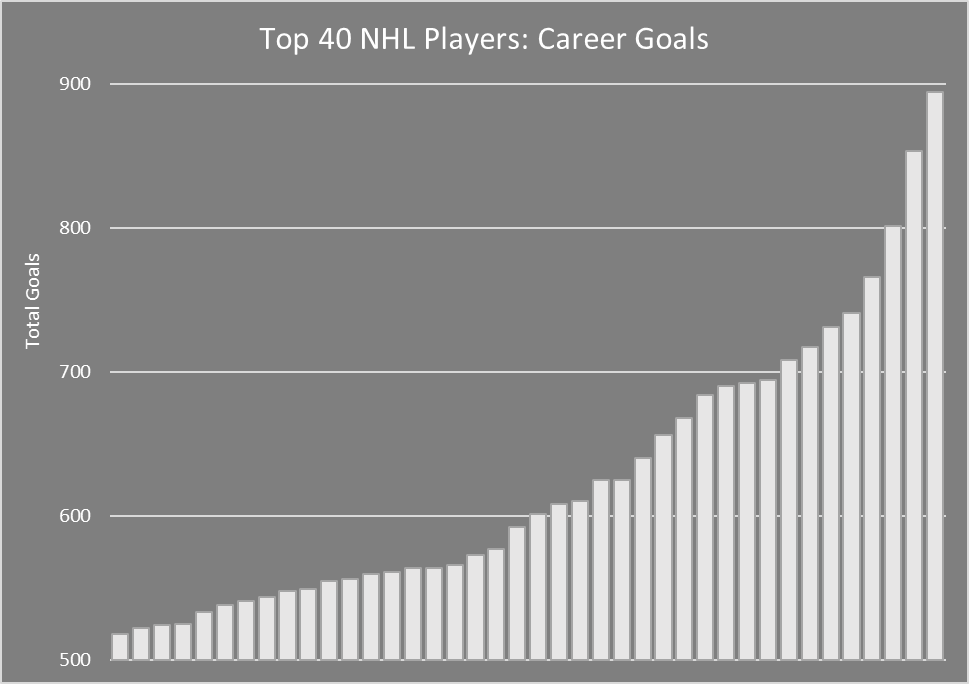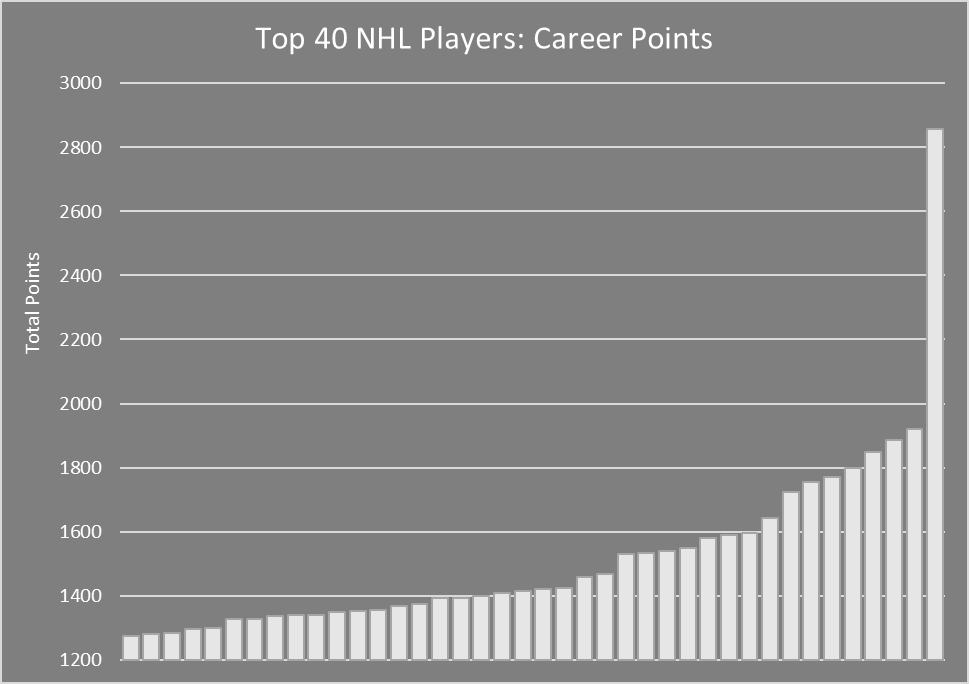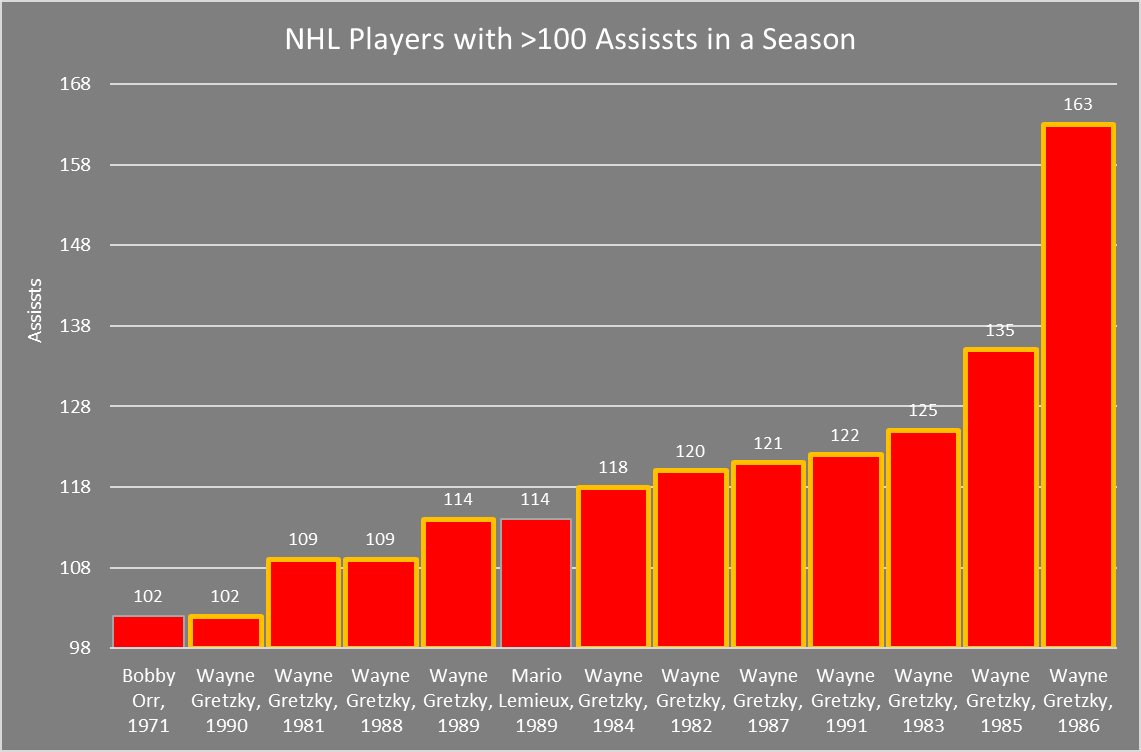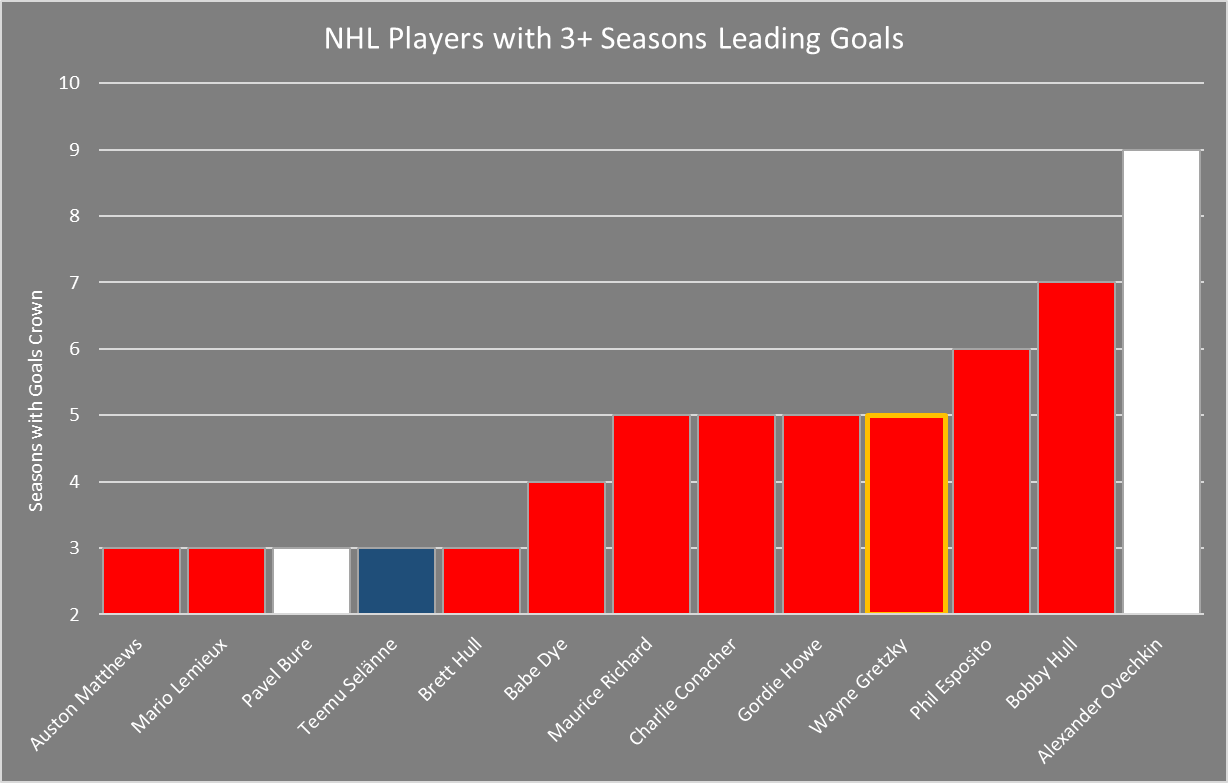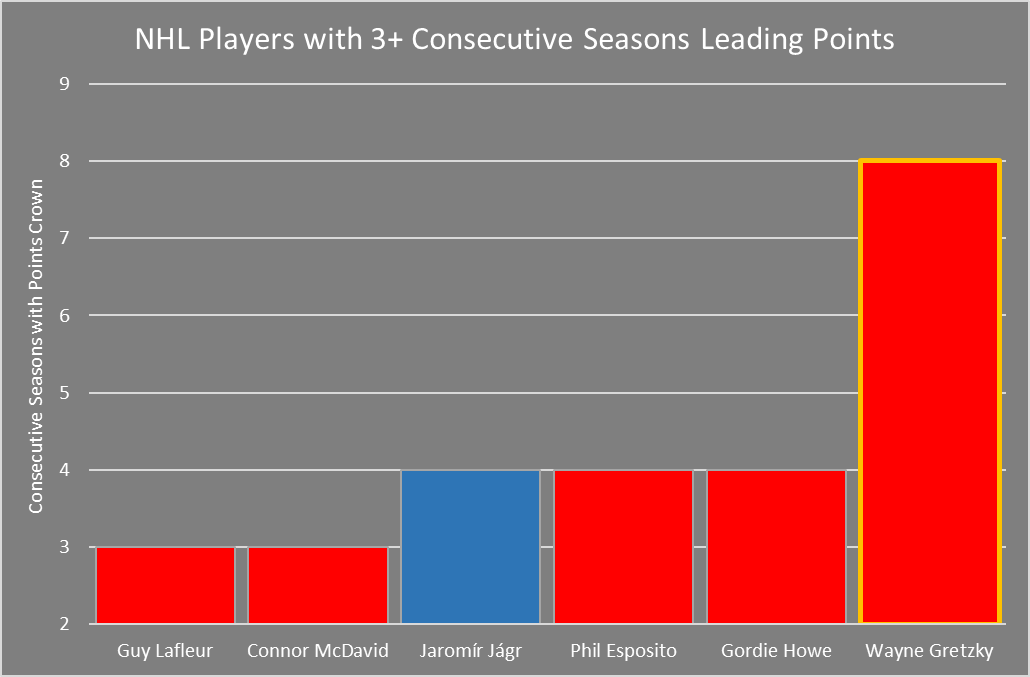Record Records - Part 11, Hockey-I: Wayne Gretzky
Spreading the love to further sports, there is a player from ice hockey that demands our attention. I’m no ice hockey expert, in truth I find the sport mystifying. But one thing I can get behind is remarkable statistical achievements, and the one’s we’re exploring today are as remarkable as any you’ll ever come across.
Scrutinising sport is a funny thing. It’s a competition of physical prowess, mental toughness, team work, preparation, all that jazz that coaches go on about. But it’s hard to put a number on mental toughness, hard to precisely define how prepared an athlete is, hard to objectively state the team work at play. But we want to know these things! The inherent nature of competition drives the desire to quantify who is competing the best, and those really invested in the culture and fabric of a sport know that winning titles and medals doesn’t always reflect this. And so we get statistics, analytics, numbers based solely on output and production by the athletes, an imperfect but inescapable surrogate for what we really want.
This series is a celebration of those in their sports that have statistical achievements so impressive I don’t think they’re likely to ever be bettered or even repeated. This is by no means supposed to fulfil some perfect list of the most impressive records and statistics across the sporting world, these are just records that are interesting and incredible in my opinion, and are therefore of course very much centred on the sports that I love or pay attention to. This series of articles is focused on sports that I am attached to, so, apologies for inevitably missing some incredible record in a field I’m ignorant of.
For other articles in this series, so far we’ve covered:
the many records of Tom Brady
the incredible feats of Wilt Chamberlain
an intro to cricket stats and the parallel achievements of Shane Warne and Muthiah Muralidaran
a discussion on the unparalleled dominance of Captain Meg Lanning
a delve into the remarkable peak of Eric Dickerson
the intertwined and astonishing careers of Lionel Messi and Cristiano Ronaldo
Following on from the piece on Messi and Ronaldo, we turn to another sport that involves low scoring and with nuances which I have had little education on: ice hockey.
Growing up, ice hockey was always a mysterious sport to me. They are so heavily garbed and padded, yet so mobile on the ice, and so remarkably aggressive for a sport that didn’t involve tackling. Raised in Australia as I was, ice skating was never a large part of my childhood. This makes the feats of figure skaters and hockey players all the more incomprehensible and impressive, but also less relatable and engaging. It’s not as prominent culturally as the other major North American codes of basketball, baseball, or American football, and so didn’t have a large media presence either. All this is to say that I am the last person to be talking about the nuances and virtues of ice hockey. But we’ll give it a go anyway, because there is an individual from this sport whose achievements are truly mind-boggling, and who deserves a piece in this series of record records as much as anyone. The one name in ice hockey I had heard of, the great Wayne Gretzky.
Wayne Gretzky - Scoring Goals, Whoever it Takes
If he looks young here, that’s because he was already a multi-time MVP before he turned 21…
Like soccer, the only way to get points in ice hockey involves scoring goals. This means propelling a small and very hard puck at ridiculous speeds through a tiny goal protected by a massive person wearing even more massive padding. It’s very hard to do, with 1 or 2 goals a pretty standard outcome, and 5 goals for a single team an impressive showing. Also like soccer, one of the key abilities of an offensive powerhouse is to not just score goals themselves, but to make plays that lead to goals, called assists. This is taken a step further in ice hockey, where a statistic not present in soccer is recorded, called points, which is a player's total goals scored and assists provided. So if a player scores 1 goal in a game but also has 2 assists, they are recorded as having scored 3 points that game. They are credited for the goals they set-up, that’s how important assists are in ice hockey. So the points leader on the season might not be the player with the most goals, they might just be very good at assists. As Gretzky was one of those offensive powerhouses, it’s these stats that we’ll be focussing on:
Goals, both total and per game
Assists, also career and per game
Points, the combination of the above
But another aspect of ice hockey is the changing number of players on the ice. Penalties occasionally lead to shots at goal like in soccer, but usually they just involve the infringing player leaving the rink for a short period, you know, that little naughty corner box they have to sit in off to the side. During this period the team without the player are referred to as being short-handed, while the team with a numerical advantage are referred to as being in a power play. The nature of different players’ style and focus comes to the fore during these periods. A player who can make the most of the numerical advantage is obviously useful, but being up a skater is inherently useful, so more important are the players that can still score goals and keep the team in the contest during the shorthanded patches. As such we’ll also look at those scoring statistics mentioned above when also filtered by whether the team is up or down in terms of player numbers equality.
So who is this Wayne Gretzky guy?
Well, let’s start with a little background on the sport he dominated.
Ice hockey might not have quite the same cultural footprint in Australia as other North American sports, but it has a long and prestigious history. It’s been in the Winter Olympics since 1920! That’s 16 years longer than Basketball has been at the Summer Olympics. The premier competition is the National Hockey League, the NHL, which is a funny name for a sport where a quarter of the teams are based in a different country. It was founded in 1917, 3 and 30 years before the football and basketball equivalents. They play a lot of games, 82 a season, just like in the NBA. There are 32 teams, and of those, 7 are based in Canada. But, while most of the teams are based in the United States, a huge proportion of the players are from across the border, like, a seriously massive proportion. Ice Hockey is the national sport of Canada, and boy is it. Their national team has excelled, with more World Cup wins and Olympic golds for both Men’s and Women’s formats than any other country, and far and away the most representatives in the Ice Hockey Hall of Fame. In fact we will see as we get to the stats heavy part of this piece that there are very few non-Canadians represented.
One of the stupendous number of great NHL players born in Canada was Wayne Douglas Gretzky, born in 1961 in Brantford, Ontario. Raised in the hockey saturated Canadian air, he ice skated for the first time before he was 3, and his dad built an ice rink in their backyard where Wayne and his siblings would drill for hours on end. Wayne played for a 10 year old team when he was 6, and as the jerseys the other boys wore were obviously far too large for him, he tucked the excess into one side of his pants, which he continued to do throughout his entire career. Gotta love a cute origin story. The less cute part was the vitriol the Gretzky family faced due to Wayne\s prodigious talent, with many parents upset that their children were overlooked for a much younger child. His feats on the ice were so outlandishly above everyone else he was actually booed by spectators. When he was 14 his parents moved to Toronto, partly as it would be better for his budding career, but they admitted it was also partly to get him away from the toxic environment he had been playing in. Geeze.
He continued to absolutely astonish on the ice, and the minute he was old enough he was playing professionally. But, despite his truly insane statistics as a junior, many viewed his diminutive size as an issue for him to translate the success to the bigger, tougher pro leagues. His success to date had not come from athleticism, but from an astonishing read of the game coupled with remarkable reflexes and coordination. His first professional contract in the big-time was with a rival league to the NHL, the World Hockey Association (WHA), with a team called the Indianapolis Racers. But that only lasted a year as the WHA was in strife, with teams folding regularly, including the Racers in 1978. The owner was aware of this and had prudently signed Gretzky to a personal services contract instead of a team based contract, so when the Racers folded he still had Gretzky under contract and offered for him to shift to either the Edmonton Oilers or the Winnipeg Jets, and Gretzky chose the former. Before he was even 18 he signed another huge contract, this time under the owner of his new team the Oilers. In his first season with them he finished 3rd in the comp in scoring and the Oilers finished with the best record of the WHA. That would turn out to be the last season the WHA existed, because after many years of speculation, it finally folded, with 4 of its more elite teams being integrated into the NHL as expansion teams. One of these was of course the Oilers, and so Wayne Gretzky entered the NHL.
Again the critics believed his success would plateau. Sure, he had translated his dominance from the junior leagues to the pros, but that was just because it was the WHA, not the REAL deal like the NHL. Surely there his size would finally be the liability everyone assumed. Well, in his first year in the NHL he became the youngest ever player to score 50 goals, was tied for most points on the year, and won the MVP award… So, yeah, pretty good transition to the big time. He broke the scoring record the next season and was named MVP again. In his third season he broke a record that had stood for 35 years: 50 goals in 50 games. That had been done by Maurice Richard in 1944. Gretzky did it in just 39 games… That year he broke the goals record and became the first player to ever crack the 200 barrier for points (goals + assists), something he would do 4 more times in his career and still hasn’t been achieved by any other. Naturally he garnered a 3rd straight MVP, but he still hadn’t tasted championship success.
That would almost change in his 4th year, as he made his first trip to the Stanley Cup finals. But the Oilers were swept 4-0 by the defending champion New York Islanders. He did get his 4th consecutive MVP though, so, not a wasted season. His 5th year was finally the silverware year, as they again met New York in the finals, but were this time victorious. It would be the first of 4 championships Gretzky won with the Oilers in a 5 year span. He also kept winning MVPs during that span, eventually tallying a truly staggering 8 in a row out of 9 in total. Which is utterly bonkers by the way, as we will explore later.
So yeah, his Oilers years were truly phenomenal. All in all he spent 10 years with the franchise, 9 of which within the NHL. In those 9 years he had netted 4 championships, a whole trophy cabinet worth of MVPs, and had broken dozens of records that would never fall again. I mean, before him (and not since), the 200 mark for points was unreachable. For 5 years (1982-1986) he averaged it. His first 9 years in the NHL were so insanely above the rest of the sport, he could have retired there and been an instant hall of famer. But, luckily for our article on record records, his career didn’t finish. No, in a move that stunned the league, Wayne Gretzky was traded from the Oilers after the season in which they had just won back-to-back championships, their 4th in 5 years. Despite already establishing one of the greatest careers of all time, Gretzky was only 27, and captain of the best team in the NHL. But, the owner was cash strapped, and was shopping Wayne around to other lucrative franchise owners. Gretzky was personally on top of the world, having scored the winning goal in the Stanley cup and on his honeymoon. When he first got wind of the trade he was against leaving his team (understandably considering the dynasty he’d established). But, his reservations on leaving were alleviated after he had a conversation with the Los Angeles Kings owner, and the deal they struck. Wayne agreed to the trade only if two of his team-mates were involved also. What a move! It was all worked out, and so before the 1988-1989 season the Kings sent their best player, some draft picks, and a lot of cash to the Oilers in exchange for Gretzky and his 2 mates.
Now, the thing about this trade is that Gretzky had never been based in a team outside of Canada. The Oilers are based in Edmonton, which is in Canada, while he new team the Kings were based in Los Angeles, which is very much not. The trade sent a remarkable shockwave through Canada, to the point where a member of parliament demanded that the Canadian government move to block the trade! Legislative intervention not materliasing, the trade went ahead and Gretzky moved to sunny California. If you thought this upset the hockey-mad fans back home, well, at Gretzky’s first game back in Edmonton he received a standing ovation from a sellout crowd, and after the game he gave this touching address to the assembly:
"I'm still proud to be a Canadian. I didn't desert my country. I moved because I was traded and that's where my job is. But I'm Canadian to the core. I hope Canadians understand that."
After that first season away from Edmonton, the Oilers erected a statue of Gretzky holding the Stanley cup outside the stadium. Yeah, certainly no hard feelings there, it’s pretty rare a player gets a statue halfway through their career, but as we touched on before, his time with the Oilers was truly mind blowingly amazing.
Unfortunately his time with Kings would not be so mind blowingly amazing. While his arrival did lead to immediate improvement for the franchise, a huge swing in win-rate and knocking his old team (and reigning champs) out of the playoffs, they didn’t make the finals. They wouldn’t until his third season with them, but they didn’t win the Stanley cup and wouldn’t make the finals again during his time there. He still dominated statistically, but not at the same stratospheric heights as his time in Edmonton. He lost games to injury as well, and towards the end of his 8th year in LA he was traded to the St Louis Blues. But he only played the remaining 18 games of that season with them, and by the start of the next year he was in New York, playing for the Rangers at the age of 35. Age was taking its toll on his otherworldly reflexes and coordination, and while he played 3 seasons for New York, his output plummeted and the team never made a serious push for the championship. So, after the 1998-1999 season, with more than 20 years in the NHL, Wayne Gretzky retired from professional Ice Hockey. The NHL immediately retired his jersey number (99) league wide. The following year he was inducted into the International Ice Hockey Hall of Fame, the standard waiting period between retirement and consideration waived. Since then he has had stints in hockey administration and coaching, as well as providing coverage and analysis for broadcasters.
Wayne also played 55 games for Canada in international ice hockey, and while he certainly excelled compared to his peers, the statistical output was nothing as impressive as his pro-league numbers. Like many greats of the game he prioritised his NHL career, in the same vein as other superstars of North American sporting power houses like NBA and MLB. I mean, no-one uses the Olympic gold medals as part of Michael Jordan’s legacy. Gretzky did show up when the stakes were highest, playing his best hockey when Canada were up against other teams ranked in the upper echelons of the international scene. To the point where when he retired from international play he had the record for more assists, goals, and points in best-on-best games (the terminology used in international hockey for elite matchups).
So that’s a quick tour of his career in the sport. And from the events and highlights he certainly comes off looking pretty damn legendary. But if we drill down into the numbers we can really ask ourselves:
Alright, so how good was he?
Well, let’s start with the big numbers, the career totals. Filtering to nice big numbers, we see that (prior to the start of the 2024-25 season) there are 47 players with 500 or more career goals, 48 players with 750 or more career assists, and combining those metrics, 41 players with 1,250 or more career points. Though, due to most players tending to be good at scoring or play making, it’s rare a player has lots of both goals and assists. Here are those 40 odd players for each of those categories:
As you would expect, each one has a slow build at first then a more dramatic curve as the statistical outliers are reached, this is a classic pattern of these sorts of sports career totals graphs. The difference here is that we see one insane spike at the end for assists and points. As you’ve probably guessed, that’s our man Gretzky.
Look at the assist one, 48 guys have managed 750+, and only 14 of them went on to crack 1,000+. Of those 14, just 2 managed 1,200+, but that’s not a fair filter, as of those 2, one of them has 1,249, the other 1,963! Let’s zoom in to each of these to see who is populating the upper echelons alongside Gretzky. It also make the number 1 spot look even more impressive as we’ll renormalise our axes:
There are several takeaways from these. First, I’ve colour coded the graphs based on nationality, with red being Canadian, white Russian, and the different blues tending to be Swedish or Czech, though there is the occasional Finn as well. This will continue for most of the figures. As we can see already, it’s pretty damn Canadian.
Second, I’ve put a thicker, golden outline around Wayne’s column, and will continue to do so, just so you can more easily pick him out, though that’s not really an issue with most as he’s so far ahead of the pack.
Third, and this is an astonishing fact, we can see that while his most goals record is pretty closely fought, his assists (and therefore points) totals are truly staggering, unbelievably far ahead of the rest. He has 1,963 assists, more than 700 ahead of 2nd place. In fact, the most ever points (assists AND goals) by someone not named Gretzky is 1,921, which is less than just Wayne’s assist total! It hurts the brain how far ahead he is.
Fourth, and this is related to the fact that he’s impossibly far ahead of the rest for points, of the top 10 list for goals scored, 5 of them are also in the top 10 for assists. Only half, and of those half none are in the top 3 for both but Wayne. For example, Jágr is number 4 for goals and 5 for assists, Howe is 3rd for goals but 10th for assists, Messier is 3rd for assists but 9th for goals. This illustrates that usually a player is dominant at scoring or playmaking not both, which is why Gretzky being number 1 at both is truly insane.
But then, Jacob, you did say earlier that he played over 20 seasons, no wonder he has insane career stats, what about per-game?
Well, it’s a fair question. And, when we change those graphs to a per game count instead of career total, we see that Gretzky really was more the playmaker than the goal scorer:
He falls to the 7th spot in terms of goals per game, still top 10, but not as dominant as the totals. However, his assists per game are so high that he still comes out with the most points per game despite being down the line for goals. And, as we talked about before, his numbers dwindled at the end of his career (like so many other sporting legends). His time in Edmonton makes these numbers look paltry.
To see what I mean, let’s look at the best individual seasons put together by an NHL player, most goals, assists, and points in a year:
Here we see that 11 times in the history of the NHL has a player managed 70 or more goals, and 4 of those times were Gretzky, including the all time record which he set when he was 21 years old. But things get really silly when we look at the assists in a season numbers:
I mean come on, what the hell. 13 seasons ever where a player managed 100 or more assists, and only 2 of them aren’t Gretzky, and he has the top 7 spots, including the number one spot being 28 ahead of number 2. The next best non-Gretzky season is 114 assists, compared to the actual record, 163, it’s truly mind blowing. Gretzky’s vision for the game and ability to set up goals is unparalleled. 1989 was a damn good year for Lemieux too, the best ever non-Gretzky season for assists, and the 4th most goals, it was one of only 2 years between 1981 and 1991 that Gretzky didn’t lead the league in points:
This is also a silly figure, I mean there’s only 2 names on there. There have been 12 seasons where someone managed 160 or more combined assists and goals, and all of them either Lemieux or Gretzky in the 80s and 90s. Lemieux should curse the fact Gretzky was born in Canada, he should have all the records for assists and probably would have accumulated stunning numbers of MVPs if he hadn’t been playing at the same time as Wayne. I mean, he got 3 MVPs, which is pretty impressive in any sport, but he would have had bucket loads more if Wayne’s haul had been up for grabs.
As we saw before, Lemieux does have Gretzky beat for goals per game. But, one thing that sets Gretzky apart in my mind is his ability to step up when the stakes were high. We saw that before with his record performances when Canada were playing other powerhouses internationally. Well, in the NHL we can filter goals scored to those that were scored when the team is shorthanded, when they are down a player. To be down a player and still keep the scoreboard ticking over is very hard and essential for championship calibre teams. Well, in the history of the NHL only 10 players have managed 35 or more short-handed goals, that’s how hard it is to do:
I guess that’s not a surprising result considering the lead-in, but I was blown away how rapid the fall off was from the top couple to the rest.
Now, one of the hallmarks of a great season is when a player leads the league in a given statistical category. It might not be a record setting season (though most of Gretzky’s were), but if you led the league in a given year it meant that despite any league wide trends in scoring or defence or strategy etc, you still performed the best. So, here are all the players to ever have 3 or more seasons leading the NHL in goals, assists, and points:
I mean, that 2nd one is staggering. For 16 of his 20 years in the NHL Wayne Gretzky led the league in assists. And the points one is phenomenal too, as it indicates that he was also scoring lots to go with his remarkable run of leading the league in assists. It gets even crazier when we instead look at consecutive years leading the league. After all, it’s one thing to have a great season here or there, but to have a run of years leading everyone in a given stat, that’s impressive. So impressive that only a handful of players have ever managed a streak of 3 or more seasons leading in any of those categories:
The points one is cool, I mean 8 straight seasons is incredible, but again it’s his assist records that are mind-blowing. 13 years! 13 seasons straight with the most (or tied most) assists in the league. It’s so, so wild that it happened, it breaks all normal sporting statistical distributions. Even that 8 consecutive seasons for points is rarely paralleled. For example, here are the other 6+ streaks of leading widely accepted important categories in other major American big-time leagues (in roughly chronological order):
MLB, AL: Ty Cobb, best batting average for 9 years straight in the 1910s
MLB, AL: Babe Ruth, most home runs for 6 years straight in the 1920s
MLB, NL: Rogers Hornsby, best batting average for 6 years straight in the 1920s
MLB, NL: Ralph Kiner, most home runs for 7 years straight in the 1940/50s
NBA: Bob Cousy, most assists for 8 years straight in the 1950s
NBA: Wilt Chamberlain, most points for 7 years straight in the 1960s
NHL: Phil Esposito, most goals for 6 years straight in the 1970s
NBA: Michael Jordan, most points for 7 years straight in the 1980/90s
NBA: John Stockton, most assists for 9 years straight in the 1980/90s
NBA: Dennis Rodman, most rebounds for 7 years straight in the 1990s
That’s it, the only 6 year streaks of leading a stat that I could find, and not a single entry from the NFL. Leading a key statistic for consecutive years is really hard, and especially for many years straight, and it’s only gotten harder as the leagues have expanded and become more professional. I mean, the only MLB entries on that list are from the 1950s or earlier. The basketball ones are also from either the same era as Gretzky or much earlier. The best I could find anywhere was the 9 straight years of most assists that Stockton put together in the late 80s and 90s, and that’s still well short of Gretzky’s truly mind blowing run of 13 years leading the NHL in assists. And it’s not like it was a dry period in the league, he had to put up record numbers to get those seasons leading, look at what Lemieux was doing at the same time and it makes Gretzky’s streak even more insane.
Finally, I think a great indicator of how far ahead of the pack Gretzky was is the number of MVP awards he accumulated. In all of the major American sporting leagues, getting multiple MVPs is hard, and it comes down to a mixture of factors that sway the voters. And voter fatigue is a very real and well documented phenomenon. The apparent impact of a player is lessened when they’re so good for so long, the relative difference each year is lessened. Voters instead see up and coming young stars or flashy and impressive players as more deserving than stalwarts who just keep on churning out great numbers. This is why we get all-time greats who the pundits claim were robbed of MVP awards, because the voters can’t help but want to spread the love around the league. And I’ve done some numbers, LeBron James and Michael Jordan should definitely have had more MVPs, but that’s a topic for another day. But to my point on voter fatigue, in the NFL and NBA, the record for most MVPs is 5 and 6, held by Peyton Manning and Kareem Abdul-Jabbar respectively. But, neither of these certified legends ever received more than 2 back-to-back awards, their large swathe of MVP trophies were spread out over their truly illustrious careers. Indeed, only 3 times has a player ever received the MVP award for 3 straight years in the NBA, and it’s only happened once in the NFL and MLB.
Even ignoring the idea of consecutive awards, it’s hard to even get more than a handful of MVPs. Which makes sense. In a league with 30+ teams (as we see in all the major comps) the competition is vast, and so many factors are involved in an individual player's success it’s very unlikely that a player can be considered the best in the sport more than a handful of times in their career. Except Gretzky of course.
Getting more than 3 appears to be the barrier, as while dozens of players have achieved that across the comp, 4 or more is a huge step. Across Major League Baseball, the National Basketball Association, the National Football League, and the National Hockey League, only 11 players have received 4 or more MVPs. That’s it. 11 players from 4 leagues! Of those, 5 are from the NBA, 3 are from the NHL, only 2 from the NFL, and just 1 from the MLB.
This is them:
Or, in graph form:
You might notice that for only some of those legends of sport the awards came in bunches. Back-to-back MVPs are relatively common, but 3 or more consecutive MVPs is almost never heard of. Many of those elite greats never achieved 3 straight, and across the 4 major comps it’s only been done 7 times:
And Gretzly’s 8 in a row is mind blowing, eye wateringly insane.
So we ask ourselves:
Will his records ever be broken?
No.
Well, obviously that’s a little facetious. Wayne Gretzky retired with over 60 NHL records (what?!), such an astonishing number is going to have some breakable ones. But his major records are as unbreakable as any we’ve seen in this series.
I’m not going to list all his records, because that’s insane, but here are the major ones we’ve covered today:
Most goals in a season (also has 2nd most)
Most assist in a season (has top 7 spots on the list)
Most points in a season (has top 4 spots on the list)
Most goals, all time
Most goals when team is short-handed, all time
Most assist, all time (2nd place has less than 65% of his total)
Most points, all time (2nd place has less than 70% of his total)
Most assist per game
Most points per game
Most seasons leading the league in assists (16, next best is 5)
Most seasons leading the league in points (11, next best is 6)
Most consecutive seasons leading the league in assists (13, next best is 3)
Most consecutive seasons leading the league in points (8, next best is 4)
Only player to have had 3 or more consecutive seasons leading the league in goals, assists, and points
Only player
Most consecutive seasons leading in a key statistic of any major sporting league in North America
Most MVPs of any player from any major sporting league in North America
Most consecutive MVPs of any player from any major sporting league (8, next best is 4)
There is a current player in the NHL being hailed as a potential Gretzky beater, Connor McDavid, who also happens to be plying his peak years for the Edmonton Oilers. He’s played 9 seasons so far and led the league in points for 5 of them. So, that’s a parallel for sure. But the numbers are so far below Gretzky’s. In Gretzky’s 3rd season in the NHL he broke the 200 points mark, McDavid’s best season so far is 153.
Look, here are their first 9 seasons in the NHL (both with Oilers) compared:
Goals per game: McDavid 0.52, Gretzky 0.84
Assists per game: McDavid 1.00, Gretzky 1.56
Points per game: McDavid 1.52, Gretzky 2.40
MVPs: McDavid 3, Gretzky 8
Championships: McDavid 0, Gretzky 4 (though the Oilers are in the Stanley Cup as we speak, so that might become a 1 soon)
I mean, I’m not trying to make McDavid look bad, and 3 MVPs in the first 9 years of a professional career is insanely good by every other player’s standard. But just look at those numbers compared to Gretzky. And this is supposed to be the guy who could eclipse him? This for me speaks to how unbreakable Gretzky’s numbers are.
Of all those records listed, I think most goals is at a slight risk, after all he’s only 7th all time for goals per game, so we just need a prolific goal scorer to maintain that form for 20 years… That same guy would probably take the short-handed goals record as well, so we can also put that one in the kind of breakable basket, but hard to imagine any time soon.
But the rest are just so scarily ahead of any one else who’s ever touched the ice, so against the grain of all understood sporting statistics. They’re actually not as far ahead of the next as Don Bradman’s batting average, but there’s more of them, he might be as much of an ice hockey statistical outlier as Bradman was to cricket. That’s how unbreakable these records are. And, unique so far in our articles to date, they’re not just unbreakable within the sport itself. I truly believe that 9 MVPs is unbreakable in modern professional sport, and especially 8 in a row. I also believe that leading a league in a key statistic for 13 years straight is a ridiculous statistical anomaly we won’t see again in any sport. I can’t throw enough hyperbole at the keyboard right now to properly convey how insane these records are. Creating this piece, I kept having to pick my jaw up as I created yet another graph showing Gretzky accumulating records that just shouldn’t be possible.
I don’t have to know ice hockey to know that no-one, not ever again, will be as dominant or as transcendent in their sport as Wayne Gretzky was in the NHL. He is more to ice hockey than Michael Jordan is the basketball, or Tom Brady to gridiron, or Lionel Messi to soccer. There’s a reason why his nickname in the NHL was “the Great One”.
Thank you for reading, and I truly hope it’s not such a long break before my next publication. Also, I guess it would have made sense to publish something cricket related during the T20 World Cup, but hey, I mentioned Bradman so that’s something…
Media taken from:





